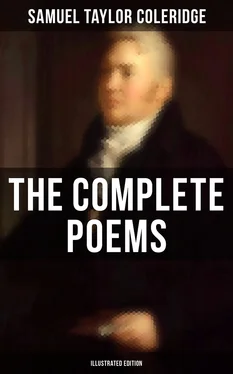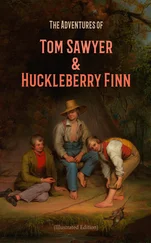Wednesday Night, 11 o'clock, December 19
I see now that the eye refuses to decide whether it be surface or convexity, for the exquisite oneness of the flame makes even its angles so different from the angles of tangible substances. Its exceeding oneness added to its very subsistence in motion is the very soul of the loveliest curve—it does not need its body as it were. Its sharpest point is, however, rounded, and besides it is cased within its own penumbra.
FOR THE "SOOTHER IN ABSENCE" Friday Morning, Dec. 21, 8 o'clock
How beautiful a circumstance, the improvement of the flower, from the root up to that crown of its life and labours, that bridal-chamber of its beauty and its two-fold love, the nuptial and the parental—the womb, the cradle, and the nursery of the garden!
Quisque sui faber —a pretty simile this would make to a young lady producing beauty by moral feeling.
Nature may be personified as the πολυμηχανος εργανη, an ever industrious Penelope, for ever unravelling what she has woven, for ever weaving what she has unravelled.
THE MEDITERRANEAN
Oh, said I, as I looked at the blue, yellow, green and purple-green sea, with all its hollows and swells, and cut-glass surfaces—oh, what an ocean of lovely forms! And I was vexed, teased that the sentence sounded like a play of words! That it was not—the mind within me was struggling to express the marvellous distinctness and unconfounded personality of each of the million millions of forms, and yet the individual unity in which they subsisted.
A brisk gale and the foam that peopled the alive sea, most interestingly combined with the number of white sea-gulls, that, repeatedly, it seemed as if the foam-spit had taken life and wing and had flown up—the white precisely-same-colour birds rose up so close by the ever-perishing white-water wavehead, that the eye was unable to detect the illusion which the mind delighted to indulge in. O that sky, that soft, blue, mighty arch resting on the mountain or solid sea-like plain—what an awful omneity in unity! I know no other perfect union of the sublime with the beautiful, so that they should be felt, that is, at the same minute, though by different faculties, and yet, each faculty be predisposed, by itself, to receive the specific modifications from the other. To the eye it is an inverted goblet, the inside of a sapphire basin, perfect beauty in shape and colour. To the mind, it is immensity; but even the eye feels as if it were [able] to look through with [a] dim sense of the non-resistance—it is not exactly the feeling given to the organ by solid and limited things, [but] the eye feels that the limitation is in its own power, not in the object. But [hereafter] to pursue this in the manner of the old Hamburg poet [Klopstock].
I WILL LIFT UP MINE EYES TO THE HILLS
One travels along with the lines of a mountain. Years ago I wanted to make Wordsworth sensible of this. How fine is Keswick vale! Would I repose, my soul lies and is quiet upon the broad level vale. Would it act? it darts up into the mountain-top like a kite, and like a chamois-goat runs along the ridge—or like a boy that makes a sport on the road of running along a wall or narrow fence!
FORM AND FEELING
One of the most noticeable and fruitful facts in psychology is the modification of the same feeling by difference of form. The Heaven lifts up my soul, the sight of the ocean seems to widen it. We feel the same force at work, but the difference, whether in mind or body that we should feel in actual travelling horizontally or in direct ascent, that we feel in fancy. For what are our feelings of this kind but a motion imagined, [together] with the feelings that would accompany that motion, [but] less distinguished, more blended, more rapid, more confused, and, thereby, co-adunated? Just as white is the very emblem of one in being the confusion of all.
VERBUM SAPIENTIBUS
Mem.—Not to hastily abandon and kick away the means after the end is or seems to be accomplished. So have I, in blowing out the paper or match with which I have lit a candle, blown out the candle at the same instant.
THE CONTINUITY OF SENSATIONS
How opposite to nature and the fact to talk of the "one moment" of Hume, of our whole being an aggregate of successive single sensations! Who ever felt a single sensation? Is not every one at the same moment conscious that there co-exist a thousand others, a darker shade, or less light, even as when I fix my attention on a white house or a grey bare hill or rather long ridge that runs out of sight each way (how often I want the German unübersekbar !) [untranslatable]—the pretended sight-sensation, is it anything more than the light-point in every picture either of nature or of a good painter? and, again, subordinately, in every component part of the picture? And what is a moment? Succession with interspace? Absurdity! It is evidently only the icht-punct in the indivisible undivided duration.
See yonder rainbow strangely preserving its form on broken clouds, with here a bit out, here a bit in, yet still a rainbow—even as you might place bits of coloured ribbon at distances, so as to preserve the form of a bow to the mind. Dec. 25, 1804.
HIS CONVERSATION, A NIMIETY OF IDEAS, NOT OF WORDS
There are two sorts of talkative fellows whom it would be injurious to confound, and I, S. T. Coleridge, am the latter. The first sort is of those who use five hundred words more than needs to express an idea—that is not my case. Few men, I will be bold to say, put more meaning into their words than I, or choose them more deliberately and discriminately. The second sort is of those who use five hundred more ideas, images, reasons, &c., than there is any need of to arrive at their object, till the only object arrived at is that the mind's eye of the bystander is dazzled with colours succeeding so rapidly as to leave one vague impression that there has been a great blaze of colours all about something. Now this is my case, and a grievous fault it is. My illustrations swallow up my thesis. I feel too intensely the omnipresence of all in each, platonically speaking; or, psychologically, my brain-fibres, or the spiritual light which abides in the brain-marrow, as visible light appears to do in sundry rotten mackerel and other smashy matters, is of too general an affinity with all things, and though it perceives the difference of things, yet is eternally pursuing the likenesses, or, rather, that which is common [between them]. Bring me two things that seem the very same, and then I am quick enough [not only] to show the difference, even to hair-splitting, but to go on from circle to circle till I break against the shore of my hearers' patience, or have my concentricals dashed to nothing by a snore. That is my ordinary mishap. At Malta, however, no one can charge me with one or the other. I have earned the general character of being a quiet well-meaning man, rather dull indeed! and who would have thought that he had been a poet ! "O, a very wretched poetaster, ma'am! As to the reviews, 'tis well known he half-ruined himself in paying cleverer fellows than himself to write them," &c.
THE EMBRYONIC SOUL
How far might one imagine all the theory of association out of a system of growth, by applying to the brain and soul what we know of an embryo? One tiny particle combines with another its like, and, so, lengthens and thickens, and this is, at once, memory and increasing vividness of impression. One might make a very amusing allegory of an embryo soul up to birth! Try! it is promising! You have not above three hundred volumes to write before you come to it, and as you write, perhaps, a volume once in ten years, you have ample time.
My dear fellow! never be ashamed of scheming—you can't think of living less than 4000 years, and that would nearly suffice for your present schemes. To be sure, if they go on in the same ratio to the performance, then a small difficulty arises; but never mind! look at the bright side always and die in a dream! Oh!
Читать дальше












